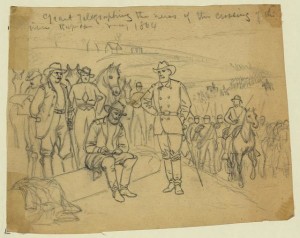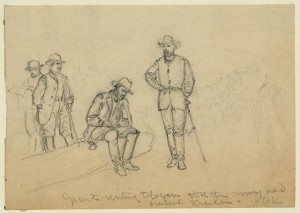150 years ago today the Union Army of the Potomac crossed the Rapidan. As I was looking at the two images said to be of General Grant telegraphing the news of the crossing (here and here) I sort of thought of the Rubicon. It is written when Julius Caesar crossed the Rubicon he said, “Alea iacta est” (the die has been cast). After the crossing Caesar couldn’t go back; as it turned out, after Grant crossed the Rapidan, he wouldn’t go back. J. Caesar crossed the Rubicon to challenge and change the existing political order; General Grant crossed the Rapidan to enforce the will of the elected politicians. In fact, on April 30th the general received a note of support from the political chief of the United States. From The Papers And Writings Of Abraham Lincoln, Volume Seven:
TO GENERAL U. S. GRANT.
EXECUTIVE MANSION, WASHINGTON, April 30, 1864.
LIEUTENANT-GENERAL GRANT:
Not expecting to see you before the spring campaign opens, I wish to express in this way my entire satisfaction with what you have done up to this time, so far as I understand it.
The particulars of your plans I neither know nor seek to know. You are vigilant and self-reliant; and, pleased with this, I wish not to obtrude any restraints or constraints upon you. While I am very anxious that any great disaster or capture of our men in great number shall be avoided, I know that these points are less likely to escape your attention than they would be mine. If there be anything wanting which is within my power to give, do not fail to let me know it.
And now, with a brave army and a just cause, may God sustain you.
Yours very truly,
A. LINCOLN.
The images include Ely S. Parker, a Seneca Indian who was serving as an aid to General Grant. He probably was still mourning the April 24th death of his father, who fought for the United States in the War of 1812.
From a Seneca County, New York newspaper in 1864:
DEATH OF AN INDIAN CHIEF. – The Seneca tribe have lost their prominent chief in the person of WM. PARKER , who expired on the Tonawanda Reservation a few days since. He was the father of Capt. Eli S. Parker, Aid to General Grant, and in our last war with Great Britain, distinguishing himself as a warrior. In the sortie of Fort Erie he was badly wounded and was pensioned by the U.S. Government.


